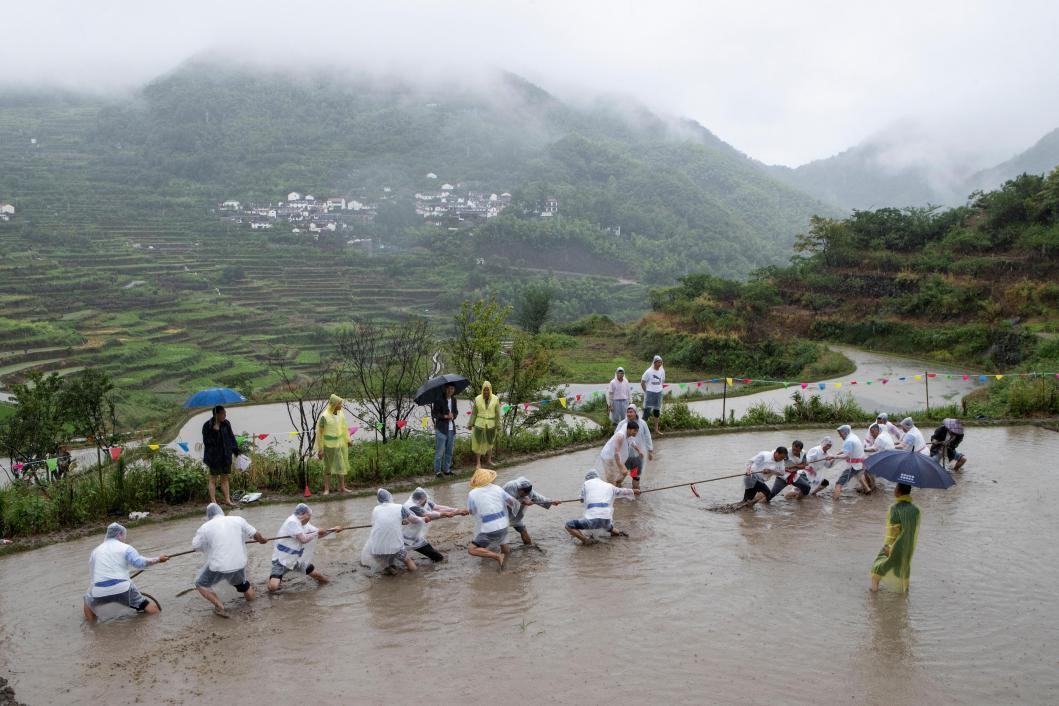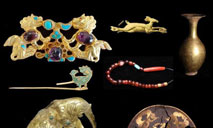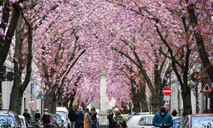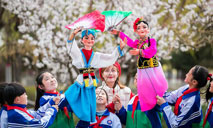Villages in E China turn tourism resources into fortune, embrace vitalization (4)
 |
| A tug of war competition is held in a terraced field on Fuzhi Mountain of Lingnan Township, Shaoxing, east China's Zhejiang Province, June 20, 2020. (People's Daily Online/Zhu Shengjun) |
As rape flowers started to blossom in the 23,000 terraced fields, which cover 2,300 mu, or 153 hectares on Fuzhi Mountain of Lingnan Township, Shangyu District, the township kicked off its 12th rape flower festival.
It is reported that the 23,000 terraced fields of the township located in Shaoxing, east China's Zhejiang Province, have a history of over a thousand years.
Together with traditional local residential buildings beside them, these terraced fields attracted flocks of tourists, including livestreaming hosts and enthusiasts of traditional Chinese costumes, who wanted to experience the natural beauty of the terraced fields and the charm of the local residence.
Rural business forms must be enriched to vitalize the countryside, and the cultural and tourism sector is a major area where efforts shall be taken. China's 14th Five-Year Plan proposed to vigorously develop leisure agriculture, rural tourism, B&Bs and other featured business forms in the countryside. To do this, featured resources are a prerequisite.
Located two and a half hours' drive from Shanghai, Lingnan Township enjoys favorable geographical advantages. Besides, it has abundant ancient towns lying beside creeks or rivers, which gives it a unique and antique taste.
"Apart from the resources, it's also important to respect the people, their traditions, and local customs in rural areas, and help them solve practical problems, meet their expectations for development, and extend their history, so as to achieve sustainable development of rural tourism," said an expert.
Lingnan Township has conformed to its residents' expectation to improve their life quality. It planted rape flowers which both keep farmlands fertile and increase the income for villagers. Roads, bathrooms, as well as other infrastructure projects have been built in the township for better development of tourism, and it also introduced sewage disposal facilities to improve the life quality of villagers.
Besides, the township is also working on the renovation and protection of ancient residential buildings to maintain their original appearance. With mud-made outer walls, wood beams and French windows, the residential buildings look both antique and modern. "It's a great experience to live in them," said a tourist.
Realizing the value of their local culture, a great number of young people who worked out of town decided to go back to their hometown.
"Our history and culture are here, and so are our families. We can both take care of our children and make money here," said Wang Yongyong, a man in his thirties who returned with his family and started a B&B hotel. The man now earns a decent income.
In today's era, to better transform "resources" into "assets," internet offers a great channel, especially new media. An online rape flower festival was held this year in the township, attracting over 600,000 visits. The township also hosted an online photography competition, winning more attention on its traditional villages.
 |
Photos
Related Stories
- China's tourism revenue to reach 195 bln USD in H1: CTA
- Xi stresses modernizing agriculture and countryside, boosting rural vitalization
- People enjoy flowers across China
- Xi stresses modernizing agriculture and countryside, boosting rural vitalization
- Building on anti-poverty success, China turns to rural vitalization
- Town in Hunan carves own path to success
- Lanzhou Shuimo Danxia Scenic Spot to be opened to tourists
- Spring holidays show robust recovery of tourism industry
- Rural tourism helps increase villagers' income in Sichuan
- Int'l tourist arrivals fall by 87 pct in January: UNWTO
Copyright © 2021 People's Daily Online. All Rights Reserved.










